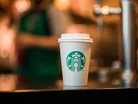Starbucks invests $10mn to develop recyclable, compostable coffee cup

In an age or automation, robotics and blockchain, Starbucks is hoping to revolutionise a seemingly low-tech product — the coffee cup.
Working alongside environmental organisations such as Closed Loop Partners and its Center for the Circular Economy, the coffee giant is committing $10mn to launch the 'NextGen Cup challenge'.
The aim of the initiative is to provide grants to help entrepreneurs create a fully recyclable, compostable cup that could be brought to the market within three years.
"We want to make sure this technology is available to everyone because it’s the right thing to do,” said Andy Corlett, director of packaging R&D for Starbucks.
“The idea of environmental sustainability in packaging is not just a Starbucks issue. It’s a global issue. Anything that gets us closer to that goal is not something we want to keep to ourselves.”
SEE ALSO:
- Jumeirah Restaurant Group is to go entirely plastic-free
- Starbucks trials 5p cup charge in bid to tackle plastic waste
- Starbucks, PepsiCo and Mars Inc among world's most ethical companies in 2018
Each year, an estimated 600bn paper and plastic cups are used globally, with Starbucks accounting for around 1% of these, says the company.
Therefore, the US-firm is keen to make a sustainable, environmentally-friendly alternative.
“No one is satisfied with the incremental industry progress made to date, it’s just not moving fast enough,” said Colleen Chapman, vice president of Starbucks global social impact overseeing sustainability.
“So today, we are declaring a moon shot for sustainability to work together as an industry to bring a fully recyclable and compostable cup to the market, with a three-year ambition.”
Many consumers today may believe that the industry's paper cups can be easily recycled.
However, disposable coffee cups often have a thin plastic lining to make them watertight and the paper is often contaminated by coffee or tea, making them often difficult to recycle.
Starbucks cups are currently made with 10% post-consumer recycled fibre. To encourage consumers to use recyclable cups, the company is currently trialling a 5p levy for paper cups in London to see if this influences consumer behaviour.
- Unilever Speaks on Failure of Global Plastics TreatySustainability & ESG
- Primark & H&M: Pursuing Textile Manufacturing CircularitySustainability & ESG
- ABB & NKT: Electrifying World's Largest Submarine CableSustainability & ESG
- Oxagon: The Five Key Manufacturing Principles of the FutureSustainability & ESG

